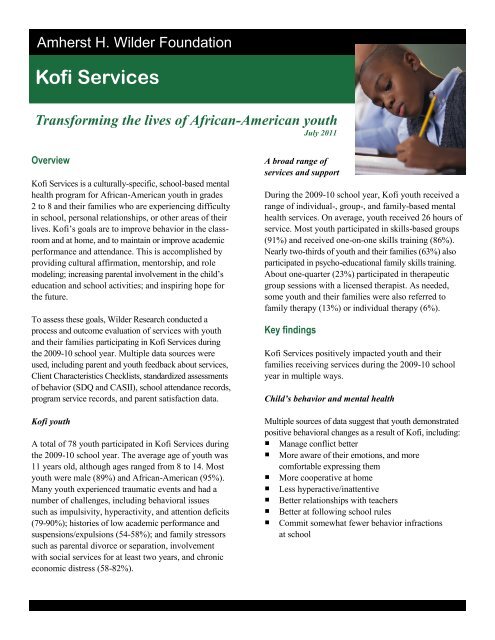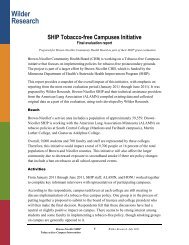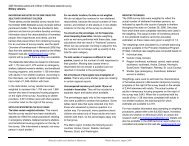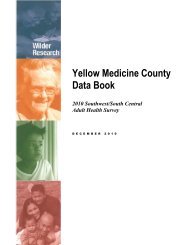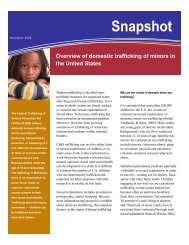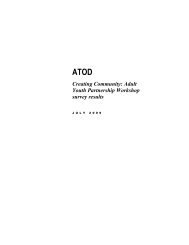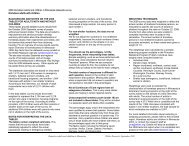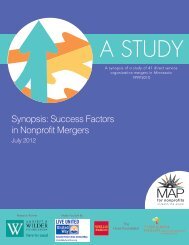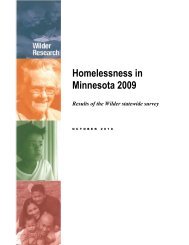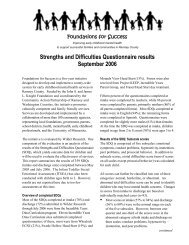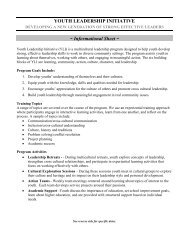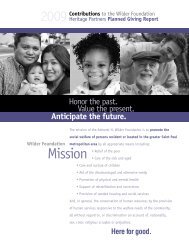Kofi Services - Amherst H. Wilder Foundation
Kofi Services - Amherst H. Wilder Foundation
Kofi Services - Amherst H. Wilder Foundation
You also want an ePaper? Increase the reach of your titles
YUMPU automatically turns print PDFs into web optimized ePapers that Google loves.
<strong>Amherst</strong> H. <strong>Wilder</strong> <strong>Foundation</strong><br />
<strong>Kofi</strong> <strong>Services</strong><br />
Transforming the lives of African-American youth<br />
July 2011<br />
Overview<br />
<strong>Kofi</strong> <strong>Services</strong> is a culturally-specific, school-based mental<br />
health program for African-American youth in grades<br />
2 to 8 and their families who are experiencing difficulty<br />
in school, personal relationships, or other areas of their<br />
lives. <strong>Kofi</strong>’s goals are to improve behavior in the classroom<br />
and at home, and to maintain or improve academic<br />
performance and attendance. This is accomplished by<br />
providing cultural affirmation, mentorship, and role<br />
modeling; increasing parental involvement in the child’s<br />
education and school activities; and inspiring hope for<br />
the future.<br />
To assess these goals, <strong>Wilder</strong> Research conducted a<br />
process and outcome evaluation of services with youth<br />
and their families participating in <strong>Kofi</strong> <strong>Services</strong> during<br />
the 2009-10 school year. Multiple data sources were<br />
used, including parent and youth feedback about services,<br />
Client Characteristics Checklists, standardized assessments<br />
of behavior (SDQ and CASII), school attendance records,<br />
program service records, and parent satisfaction data.<br />
<strong>Kofi</strong> youth<br />
A total of 78 youth participated in <strong>Kofi</strong> <strong>Services</strong> during<br />
the 2009-10 school year. The average age of youth was<br />
11 years old, although ages ranged from 8 to 14. Most<br />
youth were male (89%) and African-American (95%).<br />
Many youth experienced traumatic events and had a<br />
number of challenges, including behavioral issues<br />
such as impulsivity, hyperactivity, and attention deficits<br />
(79-90%); histories of low academic performance and<br />
suspensions/expulsions (54-58%); and family stressors<br />
such as parental divorce or separation, involvement<br />
with social services for at least two years, and chronic<br />
economic distress (58-82%).<br />
A broad range of<br />
services and support<br />
During the 2009-10 school year, <strong>Kofi</strong> youth received a<br />
range of individual-, group-, and family-based mental<br />
health services. On average, youth received 26 hours of<br />
service. Most youth participated in skills-based groups<br />
(91%) and received one-on-one skills training (86%).<br />
Nearly two-thirds of youth and their families (63%) also<br />
participated in psycho-educational family skills training.<br />
About one-quarter (23%) participated in therapeutic<br />
group sessions with a licensed therapist. As needed,<br />
some youth and their families were also referred to<br />
family therapy (13%) or individual therapy (6%).<br />
Key findings<br />
<strong>Kofi</strong> <strong>Services</strong> positively impacted youth and their<br />
families receiving services during the 2009-10 school<br />
year in multiple ways.<br />
Child’s behavior and mental health<br />
Multiple sources of data suggest that youth demonstrated<br />
positive behavioral changes as a result of <strong>Kofi</strong>, including:<br />
• Manage conflict better<br />
• More aware of their emotions, and more<br />
comfortable expressing them<br />
• More cooperative at home<br />
• Less hyperactive/inattentive<br />
• Better relationships with teachers<br />
• Better at following school rules<br />
• Commit somewhat fewer behavior infractions<br />
at school
<strong>Kofi</strong> <strong>Services</strong><br />
Page 2<br />
Cultural identity<br />
Both youth and parents reported an enhanced appreciation<br />
for African-American culture. Youth reported learning<br />
more about African-American history which gave them<br />
an increased sense of confidence and pride.<br />
Parent/child relationship<br />
Parents generally felt their relationship with their child<br />
had improved since their involvement with <strong>Kofi</strong>. They<br />
reported youth were willing to communicate more openly<br />
and talk with parents about school and their feelings.<br />
Parental involvement in and relationship with<br />
child’s school<br />
Many parents said they were more involved in their child’s<br />
schooling and had improved relationships with their<br />
child’s teacher. They reported enhanced communication,<br />
feeling more welcomed at their child’s school, and<br />
feeling more positive about their interactions with the<br />
school in general.<br />
Parental knowledge and capacity<br />
Parents reported they knew more about school policies<br />
and were better able to support their child’s education.<br />
Specifically,<br />
• Some parents felt better able to meet their child’s<br />
emotional, physical, and cultural needs<br />
• Many parents said they learned more about<br />
community resources and support<br />
Program satisfaction<br />
Youth were generally satisfied with the program and<br />
staff, noting how <strong>Kofi</strong> provided them with a forum to<br />
talk about personal issues and topics of interest.<br />
I learned how to let go of stuff that’s holding me back –<br />
like, don’t keep on dwelling on stuff that’s holding me<br />
back. Don’t hold grudges. Let go and keep moving<br />
forward. — Youth<br />
Parents were overwhelmingly satisfied with the services<br />
and staff. In particular, parents appreciated the one-on-one<br />
support staff provided to youth and their availability to<br />
talk with youth about issues in their life.<br />
He is more excited about African American culture.<br />
{<strong>Kofi</strong> staff} has been able to demonstrate what I<br />
was trying to do at home. It’s been a blessing. He<br />
is more willing to talk more about African American<br />
men as a whole. — Parent<br />
He is much more open and willing to trust me. <strong>Kofi</strong><br />
taught him that the people around you are there to<br />
help. — Parent<br />
Issues to consider<br />
To maintain and enhance the positive impact of<br />
services on youth and families, staff might consider:<br />
• Expanding or extending the length of the program<br />
• Identifying ways to provide additional support to<br />
youth during periods of conflict<br />
• Encouraging parents to continue to stay involved in<br />
their child’s lives and ways of routinely connecting<br />
with their child (e.g., reading, homework, eating<br />
meals together)<br />
• Finding opportunities for youth to provide input<br />
into services and shape programming<br />
For more information about <strong>Kofi</strong> <strong>Services</strong>,<br />
contact Rudy Rousseau at 651-325-2766,<br />
rudy.rousseau@wilder.org or visit www.wilder.org.<br />
Prepared by: Monica Idzelis, <strong>Wilder</strong> Research<br />
JULY 2011<br />
For more than 100 years, the <strong>Wilder</strong> <strong>Foundation</strong> has combined direct service,<br />
research, and community development to address the needs of the most<br />
vulnerable people in greater Saint Paul.<br />
<strong>Kofi</strong> <strong>Services</strong> 651-325-2766 560 Concordia Ave, St. Paul, MN 55103


